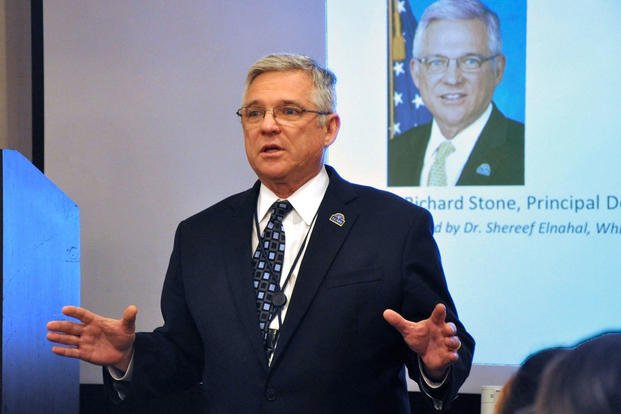The head of the Veterans Health Administration said Thursday that there is no "secret plan" to privatize Department of Veterans Affairs health care under the Mission Act, which expands community-care options and has repeatedly been championed by President Donald Trump.
"There is no such plan," said Dr. Richard Stone, executive in charge of the VHA and its system of more than 170 medical centers and 1,000 clinics nationwide.
Talk of privatization "creates fear and trepidation among our 341,000 brothers and sisters that call themselves employees of the VHA," he said. "Let me assure you that if you're an employee of the VA, there's no plan to privatize. Your job is safe; stay with us."
The question of privatization loomed over the Mission Act before and after it was passed last year with the intent of consolidating and streamlining the problem-plagued Choice program.
In signing the Mission Act into law last June, Trump said, "All during the campaign, I'd go out and say, 'Why can't they just go see a doctor instead of standing in line for weeks and weeks and weeks?' Now they can go see a doctor. It's going to be great."
Despite continuing problems with access, Stone, a former deputy surgeon general of the Army and recipient of the Combat Action Badge, said that veterans themselves have shown that they prefer the VA to private, or community care.
"We can offer access to health care at unprecedented rates" at the VHA, the nation's largest health care system, he said.
In calendar year 2018, "we did more than 58 million appointments with veterans. That's 3.7 million more than four years ago," Stone said. In addition, the VHA has cut wait times for urgent appointments from 19 days in 2014 to two days last year.
"And we continue to get better," he said.
Stone made the comments at one of the VA's periodic webcast Town Halls on issues facing the department.
VA Secretary Robert Wilkie opened the webcast, pointing to recent studies by the Partnership for Public Service and Dartmouth showing that the VA is "one of the best places to work" in government, and also stating that the VHA provides health care that is as good or better than the private sector.
Wilkie listed his priorities going forward as curbing veteran suicides, implementing the Mission Act, and putting in place new electronic health records to make VA and Defense Department systems interoperable.
He said the VA had recently awarded contracts that could be worth $55 billion through 2026 for implementing the Mission Act for VA Regions 1, 2 and 3, covering 36 states, plus Washington, D.C.; Puerto Rico; and the U.S. Virgin Islands.
The contracts went to Optum Public Sector Solutions Inc., the government-services branch of Optum, the health services arm of UnitedHealth Group. Another regional contract is expected to be awarded in April and two more in December, Wilkie said.
-- Richard Sisk can be reached at Richard.Sisk@Military.com.












